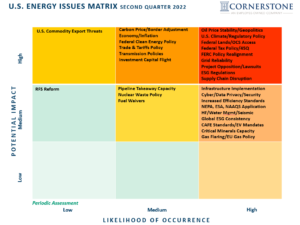Over the past quarter, the impacts of the Russian invasion of Ukraine and resulting energy sanctions against Russia and the realignment of global energy trade and markets have dominated energy-related news. The results have been high commodity prices, which are impacting the global economy and geopolitics. “Oil Price Stability/Geopolitics” stands out as the most impactful issue on the Cornerstone Q2 US Energy Issues Matrix. Nothing is more consequential. High energy prices are among the factors causing high inflation. It is contributing to a global economic downturn and is resulting in a massive realignment of global trading partnerships and alliances, especially in energy markets.
“U.S. Climate/Regulatory Policy” remains a “High-High” issue as the federal government continues to develop public policies aligned with meeting climate goals, strengthened by the U.S. recommitment to the Paris Climate Accords and commitments made during the COP26 climate conference last November in Glasgow. That overarching policy impacts other issues in the matrix, such as “Federal Tax Policy/45Q” (a proposed tax credit extension for carbon capture and storage), “FERC Policy Realignment,” “Gas Flaring/EU Gas Policy,” “Carbon Price/Border Adjustment” and “Federal Clean Energy Policy.”
The heightened interest in overall energy security and the need for short-term fossil energy supplies in the market are forcing what many are terming a “two-pronged energy policy” effort – one that bolsters domestic and global fossil energy supply while adhering to and advancing longer-term climate goals, decarbonization efforts, and zero-carbon commitments. Addressing both goals proves difficult for an Administration that set goals of eliminating the production and use of fossil energy through policies like “Federal Lands/OCS Access” moratoria and replacing them with issues like increased “CAFE Standards/EV Mandates,”
“Grid Reliability” is receiving increased attention as the nation faces the prospect of blackouts this summer due to an inability to generate and deliver enough electricity to markets and consumers. “Cyber Security/Data Privacy” is also heightened due to recent grid and pipeline attacks by Russia and China and growing geopolitical tensions.
As we move into Q3 2022, it will be interesting to see if Congress and the Administration can work together to address high commodity prices in a way that also addresses climate policy, decarbonization, and net zero goals. As mid-term elections approach, however, bipartisan cooperation will be increasingly difficult.


